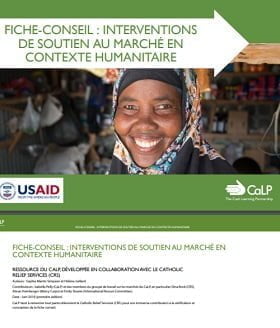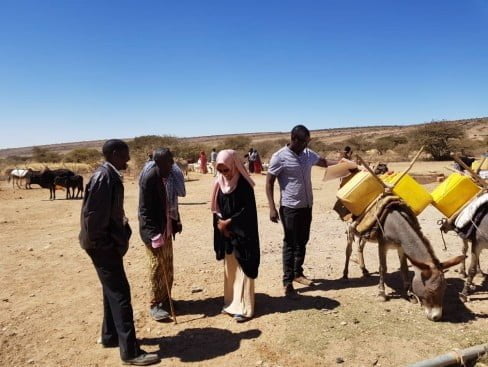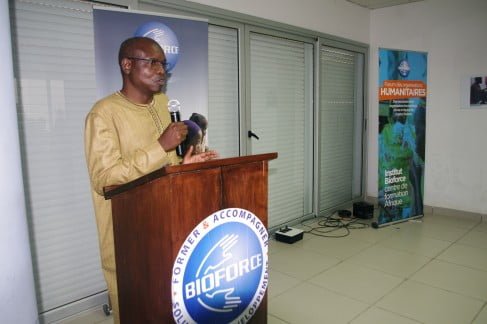Marchés
Lors de la conception d’une intervention humanitaire et de la prise de décisions quant à l’utilisation des transferts monétaires, l’analyse générale des options de réponse doit inclure une analyse de marché. Il est prouvé qu’offrir un soutien ciblant le fonctionnement des marchés accélère la reprise et accroît la résilience dans les zones affectées par une catastrophe.
De nombreuses organisations ont investi dans la mise au point d’outils visant à faciliter l’analyse de marché et réfléchissent à la mise en place de programmes basés sur les marchés plus holistiques. Elles envisagent des interventions tirant profit du marché (basées notamment sur des transferts monétaires aux populations affectées), ainsi que des interventions soutenant directement les marchés (comme l’octroi de subventions conditionnelles aux vendeurs/euses pour la remise en condition du marché).
Initiatives associées
Contenu associé

1.2 Introduction à l’analyse de marché
Cours
Ce cours de 30 minutes offre une introduction à l’analyse de marché pour les contextes d’urgence. Il contient des contributions d'experts dans ce domaine. Ce cours a été développé en collaboration avec l'International Rescue Committee et le CALP Network et grâce au financement d’USAID/OFDA et de l’Agence Suisse pour le Développement et la Coopération. Il est destiné aux...

2.4 Un guide pratique pour l’analyse de marché
Cours
Ce cours en ligne de 3.5 heures vise à fournir aux équipes qui conduiront des analyses de marchés en contextes humanitaires une compréhension approfondie de la théorie et des étapes à suivre afin de leur permettre de comprendre le pourquoi et le comment du processus à suivre. Les participants seront guides à travers un scenario d'analyse de marchés d'urgence. Ce cours s'appuie sur...

Fiche-Conseil : Interventions de soutien au marché en contexte humanitaire
Guides et outils
La fiche conseil définit le programme de soutien au marché en contexte humanitaire et le décrit dans la pratique. Elle permet aux praticiens humanitaires d’envisager systématiquement des interventions de soutien au marché, parallèlement à d’autres activités du programme. Le champ d’application comprend des interventions de soutien au marché axées sur l’offre/la disponibilité...
Thematic lead
Latest

An ABC for MPC: What multipurpose cash can and cannot do
Blog Post
Terminology Matters From cash coordination workshops in Dakar to market-based programming sessions in Geneva, anyone who has ever discussed cash and voucher assistance (CVA) in a meeting can tell you that terminology is a challenge – especially when it comes to multipurpose cash. However, speaking the...

Identification Et Attenuation Des Risques D’Abus De Pouvoir Lies A L’assistance Monetaire Au Burundi
Rapport
Ce document présente les enseignements tirés de la mission conjointe HCR-PAM au Burundi visant à identifier et à atténuer les risques d’abus de pouvoir liés à l’assistance monétaire. L’analyse s’est focalisée sur l’assistance monétaire par téléphone mobile pour le retour volontaire...

It’s Planning Season Again – What CVA actors need to know about changes to the Humanitarian Programme Cycle
Blog Post
This time last year we wrote a planning season call to arms, urging Cash Working Groups (CWGs) and Clusters to work together for better inclusion of cash and voucher assistance (CVA) in the Humanitarian Response Plans (HRP). Well planning season has rolled around again, this time with some significant...

Compte-rendu du Cash Working Group Burkina du 23 août 2019
Rapport

How Will Financial Assistance Look in 2030? Here are your thoughts so far
Blog Post
In 2030, humanitarian crises and the ways in which humanitarian needs are met will look very different from today. The role of financial assistance is growing: it is estimated that $4.8 billion was delivered in cash and voucher assistance (CVA) in 2018, as well as $686 billion in remittances, while 2.5...

Celebrating #WomenHumanitarians from our Membership for World Humanitarian Day 2019
Blog Post
World Humanitarian Day is held every year on 19 August to pay tribute to aid workers who risk their lives in humanitarian service, and to rally support for people affected by crises around the world.

Lessons in Driving Large Scale Change: the CALP Network’s reflections from the Humanitarian Innovation Exchange
Blog Post
The scaling of cash programming, enabled by mobile money, represents one of the most significant recent innovations in the humanitarian sector. In two guest blogs for Elrha (Enhanced Learning and Research for Humanitarian Assistance), our Director Karen Peachey explores the CALP Network’s role in...

Guidance on Market Based Programming for Humanitarian WASH Practitioners
Guidelines and Tools
The purpose of this document is to provide practical guidance in preparedness, assessment, program design, implementation and monitoring related to Market-Based Programming (MBP) in humanitarian WASH assistance, and more specifically on: How to identify linkages between markets and WASH services &...

Leveraging Cash and Voucher Assistance in Gender-based Violence Prevention and Response
Blog Post
Despite a reported 60% scale-up in cash and voucher delivery from 2016-18, its use for protection outcomes – including to support the prevention of and response to gender-based violence – trails behind that of all other sectors. In our latest guest blog, Tenzin Manell of Women’s Refugee Commission...

Webinar: Help shape the Future of Financial Assistance report
Event
This webinar presented the scenarios and key issues arising from the CALP Network and IARAN's analysis and invited participants' input, ahead of the publication of the Future of Financial Assistance report

A New Blueprint for the Future of Financial Assistance
Blog Post
Ahead of our workshop on the Future of Financial Assistance in Amman on 24 and 25 July, Paula Gil Baizan, independent expert and a member of the steering committee for the CALP Network’s Future of Financial Assistance work, encourages us to re-imagine the blueprint upon which we build the future of...

Compte-rendu du 04 juillet 2019-CWG Burkina
Rapport
Compte-rendu du 04 juillet 2019

Compte-rendu du Cash Working Group du Niger du 31 juillet 2019
Report

Social cash transfers, generational relations and youth poverty trajectories in rural Lesotho and Malawi
Report
Report on an ESRC-DFID-funded three-year collaborative research project (ES/M009076/1) Social cash transfer schemes, which disburse cash to poor and/or vulnerable people, have proliferated across sub-Saharan Africa over the past two decades. There is growing evidence that these address symptoms of poverty...

Mitigating Risks of Abuse of Power in Cash Assistance in Afghanistan
Report
This document outlines lessons learned from a joint UNHCR-WFP project in Afghanistan aimed at identifying and mitigating the risks of abuse of power in cash assistance. The cash transfer mechanisms discussed during the mission were cash distribution through Hawalas, mobile token, mobile e-vouchers and...

Compte-rendu du Cash Working Group de Yaoundé du 17 juillet 2019
Rapport

Compte-rendu du Cash Working Group du Mali du 04 juillet 2019
Rapport

Retour sur la cérémonie de remise de diplômes par l’Institut Bioforce à Dakar.
Blog Post
Jeudi 13 juin 2019, le CALP Network a participé à la cérémonie de remise de diplômes organisée à Dakar par l’Institut Bioforce, un de nos orgaismes de formation partenaires. Lors de cet événement ont été diplômés tous les étudiants de Bioforce ayant suivi les cours fondamentaux des...

Highlights from Bioforce Institute Graduation Event in Dakar
Blog Post
On Thursday 13th June 2019 the CALP Network was part of a graduation event hosted by the Bioforce Institute, one of our training partner organisations. This event celebrated the graduation of all the Bioforce students that followed the CALP Network’s CVA fundamentals course, which was delivered by our...

Cash Coordination: A proposal from members in MENA
Blog Post
Earlier this year the CALP Network undertook regional consultations to explore options for cash coordination. This blog lays out recommendations from participants from the Middle East and North Africa who sketched out what cash coordination, and coordination more broadly, could look like in future to...
